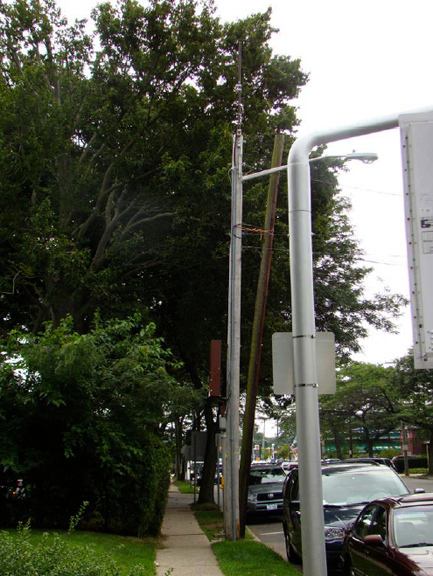NextG negotiations halted by lawsuit
Months of negotiations between community liaisons and NextG Networks, the company that installed 35 cellular antennas on telephone poles in Merrick, were recently halted by a lawsuit filed against NextG, the Town of Hempstead and Metro PCS.
Patrick Ryan, an attorney for NextG, abruptly postponed a Sept. 1 meeting with civic leaders and government representatives after members of the Merrick Gables Association filed the $100 million suit in New York State Supreme Court, according to Joe Baker, president of the South Merrick Community Civic Association.
NextG spokesman Robert Delsman said, "NextG does not offer public comment on matters in litigation."
The meeting was to be one of several held since June to potentially look at relocating certain antennas based on suggestions of community members who were disturbed to find the metal boxes affixed to poles about 10 to 20 feet from the ground. The antennas began appearing in the summer on town rights of way, often close to schools and people's front yards. By many accounts, the antennas were often installed late at night or early in the morning, with little or no notice to homeowners.
NextG, a company that provides cellular frequencies to wireless telecommunications providers using a Distributed Antenna System, or a network of small antennas fastened to poles at preset distances throughout a given area, is contracted to provide service to Metro PCS in Nassau County.
The town entered into a franchise agreement with NextG after it was determined that the New York State Public Service Commission had designated NextG a public utility. As such, NextG is governed by the Federal Telecommunications Act of 1996 , which allows the company to install structures without adhering to local zoning regulations.
NextG began holding meetings with civic leaders as a sign of goodwill toward local communities, in addition to entering into a signed agreement with the town requiring 30-day voluntary notification before installing a new structure, and also requiring new NextG poles to be permitted by the town's Highway Department.

 63.0°,
A Few Clouds
63.0°,
A Few Clouds 




